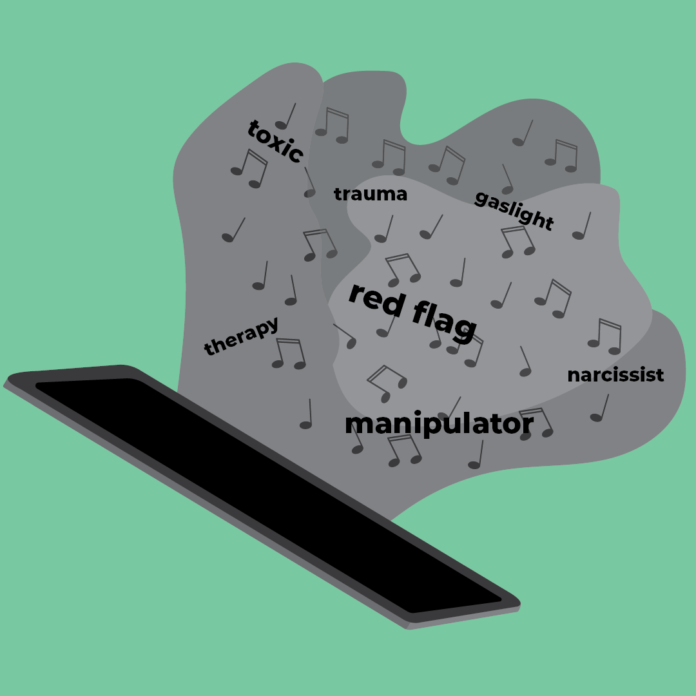If you are reading this, you are likely a social media user. It is nearly inevitable, especially if you are a young person — a student, no less, given that the last two years have turned online platforms into a vessel for education. Regardless of the extent of your social media usage, there is little doubt that you have at least heard of an app called TikTok.
Granted, the issue I am about to explain is not merely a TikTok phenomenon — users of other platforms are not exempt from this. However, I have seen this issue occur most frequently on TikTok. TikTok is a hotspot for fandom culture, with thousands of youth building their online presences around their love for film, books, music or television. However, through expressions of fandom culture on TikTok, a concerning trend has emerged — the pathologization of interests and hobbies.
Scroll a little bit, and you will find a TikTok claiming that if you listen to Japanese-American indie-pop artist Mitski, you are a “female manipulator.” Scroll a bit more, and you may find another TikTok claiming that if you enjoyed the Netflix TV series Arcane, you need to go to therapy. Scroll even further, and you may find another TikTok saying that relating to the song ‘Little Dark Age’ by MGMT (which has been popular on TikTok for months) is a ‘red flag.’
To be a ‘manipulator’ is to be the cause of abusive relationships — someone who manipulates and controls others for their benefit. This connects interests to issues of trauma and emotional abuse. Therapy is often a treatment option for those struggling with mental health issues, and a ‘red flag’ is a glaring indicator that something is wrong. This is often used with regard to someone’s behaviour.
There are numerous problems with this language, especially given how prevalent it is. On one hand, you might argue that this is stemming from an increased awareness of mental health, and you would be right. Mental health, as a conversation topic, has become more casual over time. The importance of taking care of oneself and discussing mental health with loved ones is stressed through awareness campaigns and major organizations such as the Centre for Addiction and Mental Health (CAMH). Information about mental health is becoming more accessible, as a handful of psychotherapists utilize social media to provide quick mental health education and self-care tips to the masses.
However, awareness is a double-edged sword, and in this case, certain terms that are often used in the context of discussing serious topics such as trauma and abuse (e.g., ‘gaslight,’ ‘narcissist,’ and ‘manipulator’) are being used frivolously to shame people for their interests. Even if the intention is not to shame other people — and I am sure that many behind these memes mean no harm, and perhaps are even calling themselves out as well — mental health terminology deserves to be used with an air of sensibility. By failing to do so, one is pathologizing a large swath of people based on a harmless interest.
In the case of “If you like x, you need to go to therapy,” the joke is insidious because it stigmatizes therapy, which has been an issue for decades. The joke implies that if you enjoy a particular piece of media, there is something psychologically wrong with you, and therapy is a place where people who are ‘sick’ or ‘broken’ go.
While analyzing the themes of a TV show, you might notice that they are depressing or grim, yet you know a friend who finds comfort in the show. Specifically, they may relate to it because of a struggle they have experienced in their life, which may open a heartfelt conversation for you and your friend. However, you cannot declare that someone needs to attend therapy or has a psychiatric illness based on a TV show alone — not even a therapist or psychiatrist can do that. You can be deeply affected by a severe mental illness and enjoy lighthearted media. You can be in a calm, healthy, emotional state and enjoy intense, dark media. Mental illness is diagnosed based on assessments of life circumstances and recurring cognitive, emotional and behavioural symptoms. Music taste is not a factor, and truly, it never should be. There are much more sensible ways of discussing therapy and mental illness (e.g., having a heartfelt conversation with the friend you are concerned for), rather than making jokes that only stigmatize the issue further.
As for the use of the terms ‘red flag’ and ‘manipulator,’ when discussing artistic taste, it is sinister to suggest that, because of their interests, someone may be a ‘toxic’ person who harms other people in their life. So, if you enjoy something, and it makes you a manipulator by TikTok standards, then you are a ‘bad person,’ in essence. The consequences of this language may cause people to feel ashamed for enjoying their interests.
Enjoying a song should not be a ‘red flag.’ It should not act as some sort of indicator that other people need to steer clear of you because you are a ‘bad person.’ On the other hand, one might develop a pious attitude about themselves when youth on TikTok have not yet pathologized your tastes, as if they are clean, innocent, and, by extension, a ‘good person.’ But tastes in media alone cannot determine whether you have, or have not, intentionally manipulated and hurt the people in your life and need to critically evaluate how you interact with others. We, as humans, all have an equal responsibility to be good to each other.
I hope that other people will recognize the use of pathologizing language in seemingly ‘harmless jokes,’ and its consequences. We can critically analyze media. We can talk about the relationship between human struggle and certain tropes in media. We can talk about that shared experience — swaths of people who have experienced mental illness or trauma in their life may notice that many of them enjoy the same media for the same reasons, and that, in itself, can be comforting. And yes, humour can be a way to cope.
Nevertheless, we can also acknowledge that these types of jokes do not exist in a vacuum — hardly anything ever does — and that it is important to be critical of the language we are using, and in what contexts we use it. In doing so, we may find that there are sensible and compassionate conversations to be held with each other.
































